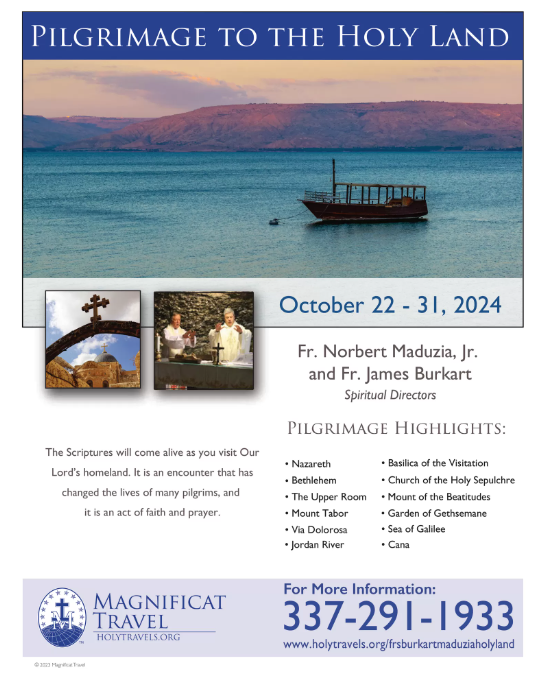Follow Us
Join our newsletter
Get the latest news delivered to your inbox.
We will get back to you as soon as possible
Please try again later
Pilgrimages


One thing I ask of the Lord, one thing I seek: to dwell in the Lord’s house all the days of my life, to enjoy the sweetness of the Lord, to seek out his temple. (Psalms 27:4)
To set off on a Holy journey… this is the hope for each one on a pilgrimage. To suddenly hear the call and to search for the destinations in which to tap into that water that Jesus mentioned to the Samaritan, the water that comes to restore the purity and all of the regal dignity of being God’s children. We participate in a pilgrimage in order to recover the lost Beauty, to shed light on our existence and adjust it, all according to the teachings of Jesus.
A pilgrimage is not simply a “trip”, but an itinerary towards religious destinations that are also important and significant. The journey covers a geographic distance, bringing us to travel our planet, admiring nature, the work of man, the signs that speak of his quest for God and of the civilizations of many people. A pilgrimage is a spiritual experience, aimed therefore at letting us complete an interior journey, inviting us deeply, because the geography and history of holy places bring together the heart and soul of those who travel, enriching them spiritually and humanly.
A pilgrimage is, therefore, a metaphor for life: the fatigue of travelling, the relaxation of arriving, the curiosity of the exploration, the enthusiasm of departing, everything relates to the commitment and – why not – the sacrifice, but also to the desire for a stable place, a fullness of life and peace.
Our role as the Church, as a community in Christ, pushes us to spread these Christian proposals. All of this also occurs materially when deciding to put oneself on the path of God. We, along with the entire Church, are called to spread the “Good Word” of the Son of God. Every pilgrimage wants to be an itinerary of the Spirit. Every pilgrimage is an opportunity to live an experience, an internal journey that answers the search for meaning in all our hearts.
The first step of the pilgrimage experience is the decision to depart, a true inspiration of the heart, but also a vocation, a calling, or rather a "con-vocation," an invitation to become a part of the pilgrim humanity, which has always set off on the path towards the chosen holy lands. Along with the decision comes waiting and expectations" every pilgrim, who has decided to depart, cannot wait to set off on the road, to reach the destination, to contemplate, to listen, to physically and spiritually rest. In a certain sense, the items a pilgrim packs reveal the kind of experience that s/he wishes to have! The luggage of a pilgrim should contain the essentials, be sober, appropriate and include the items necessary to wash and dress, but also those that help to learn and pray.

Dear Brothers and Sisters,
From Rome, on the Solemnity of the Ascension, His Holiness, Pope Francis, announced to the world the Ordinary Jubilee of the year 2025. He did so through the promulgation of the Papal Bull, Spes Non Confundit (Hope does not disappoint), taken from Romans 5:5. Therefore, hope is the central message of the coming Jubilee that, in accordance with an ancient tradition, the Pope proclaims every twenty-five years. The Holy Father writes, “Now the time has come for a new Jubilee, when once more the Holy Door will be flung open to invite everyone to an intense experience of the love of God that awakens in hearts the sure hope of salvation in Christ. The Holy Year will also guide our steps towards yet another fundamental celebration for all Christians: 2033 will mark the two thousandth anniversary of the redemption won by the passion, death and resurrection of the Lord Jesus. We are about to make a pilgrimage marked by great events, in which the grace of God precedes and accompanies his people as they press forward firm in faith, active in charity and steadfast in hope (cf. 1 Thess 1:3).”
Here are a few quotes from the Papal Bull declaring the Holy Year.
Everyone knows what it is to hope. In the heart of each person, hope dwells as the desire and expectation of good things to come, despite our not knowing what the future may bring. Even so, uncertainty about the future may at times give rise to conflicting feelings, ranging from confident trust to apprehensiveness, from serenity to anxiety, from firm conviction to hesitation and doubt. Often we come across people who are discouraged, pessimistic and cynical about the future, as if nothing could possibly bring them happiness. For all of us, may the Jubilee be an opportunity to be renewed in hope. God’s word helps us find reasons for that hope. Taking it as our guide, let us return to the message that the Apostle Paul wished to communicate to the Christians of Rome.
Hope is born of love and based on the love springing from the pierced heart of Jesus upon the cross: “For if while we were enemies, we were reconciled to God through the death of his Son, much more surely, having been reconciled, will we be saved by his life” (Rom 5:19). That life becomes manifest in our own life of faith, which begins with Baptism, develops in openness to God’s grace and is enlivened by a hope constantly renewed and confirmed by the working of the Holy Spirit.
Saint Paul is a realist. He knows that life has its joys and sorrows, that love is tested amid trials, and that hope can falter in the face of suffering. Even so, he can write: “We boast in our sufferings, knowing that suffering produces endurance, and endurance produces character, and character produces hope” (Rom 5:3-4). For the Apostle, trials and tribulations mark the lives of those who preach the Gospel amid incomprehension and persecution (cf. 2 Cor 6:3-10). Yet in those very contexts, beyond the darkness we glimpse a light: we come to realize that evangelization is sustained by the power flowing from Christ’s cross and resurrection. In this way, we learn to practice a virtue closely linked to hope, namely patience. In our fast-paced world, we are used to wanting everything now. We no longer have time simply to be with others; even families find it hard to get together and enjoy one another’s company. Patience has been put to flight by frenetic haste, and this has proved detrimental, since it leads to impatience, anxiety and even gratuitous violence, resulting in more unhappiness and self-centeredness.
Pilgrimage is of course a fundamental element of every Jubilee event. Setting out on a journey is traditionally associated with our human quest for meaning in life. A pilgrimage on foot is a great aid for rediscovering the value of silence, effort and simplicity of life. In the coming year, pilgrims of hope will surely travel the ancient and more modern routes in order to experience the Jubilee to the full. In Rome itself, along with the usual visits to the catacombs and the Seven Churches, other itineraries of faith will be proposed. Journeying from one country to another as if borders no longer mattered, and passing from one city to another in contemplating the beauty of creation and masterpieces of art, we learn to treasure the richness of different experiences and cultures, and are inspired to lift up that beauty, in prayer, to God, in thanksgiving for his wondrous works. The Jubilee Churches along the pilgrimage routes and in the city of Rome can serve as oases of spirituality and places of rest on the pilgrimage of faith, where we can drink from the wellsprings of hope, above all by approaching the sacrament of Reconciliation, the essential starting-point of any true journey of conversion. In the particular Churches, special care should be taken to prepare priests and the faithful to celebrate the sacrament of Confession and to make it readily available in its individual form.
I hereby decree that the Holy Door of the Basilica of Saint Peter in the Vatican will be opened on 24 December 2024, thus inaugurating the Ordinary Jubilee. On the following Sunday, 29 December 2024, I will open the Holy Door of my cathedral, Saint John Lateran, which on 9 November this year will celebrate the 1700th anniversary of its dedication. Then, on 1 January 2025, the Solemnity of Mary, Mother of God, the Holy Door of the Papal Basilica of Saint Mary Major will be opened. Finally, Sunday, 5 January 2025, will mark the opening of the Holy Door of the Papal Basilica of Saint Paul Outside the Walls. These last three Holy Doors will be closed on Sunday, 28 December 2025.
We will have the opportunity as a parish to visit Rome and parts of Italy to participate in the Holy Year. A pilgrimage is being planned for January 9-19, 2025. You are invited to the Orientation Meeting to be held on Saturday, June 15, 2024, here at St. Ignatius of Loyola in Sexton Hall, at 11:00 AM.
With prayers for hope founded in Christ,
Fr. Norbert



